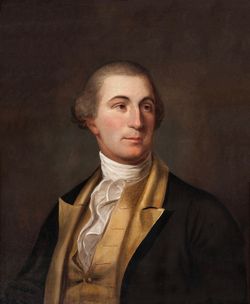“Our advices conclude with the following anecdote”
It’s easy to identify the main source of the report in John Dunlap’s Pennsylvania Packet about the new Continental flag on Prospect Hill.
That source has long been recognized as Gen. George Washington’s 4 Jan 1776 letter to his erstwhile military secretary, Joseph Reed (shown here). The commander-in-chief wrote:
However, the article’s retelling also included details not in the general’s letter, including:
TOMORROW: Looking for clues in the longer article.
That source has long been recognized as Gen. George Washington’s 4 Jan 1776 letter to his erstwhile military secretary, Joseph Reed (shown here). The commander-in-chief wrote:
We are at length favourd with a sight of his Majesty’s most gracious Speech, breathing sentiments of tenderness & compassion for his deluded American Subjects; the Eccho is not yet come to hand; but we know what it must be; and as Lord North said, & we ought to have believed (& acted accordingly) we now know the ultimatum of British Justice.Here’s a recap of the pertinent portion of the Pennsylvania Packet article, with phrases taken directly from Washington’s letter in boldface:
the Speech I send you—a volume of them was sent out by the Boston Gentry—And, farcical enough, we gave great Joy to them (the red Coats I mean) without knowing or intending it, for on that day, the day which gave being to the New Army (but before the Proclamation came to hand) we had hoisted the Union Flag in compliment to the United Colonies, but behold! it was receivd in Boston as a token of the deep Impression the Speech had made upon Us, and as a signal of Submission—so we learn by a person out of Boston last Night—by this time I presume they begin to think it strange that we have not made a formal surrender of our Lines.
Our advices conclude with the following anecdote:—That upon the King’s Speech arriving at Boston, a great number of them were reprinted and sent out to our lines on the 2d of January, which being also the day of forming the new army, the great Union Flag was hoisted on Prospect Hill, in compliment to the United Colonies—this happening soon after the Speeches were delivered at Roxbury, but before they were received at Cambridge, the Boston gentry supposed it to be a token of the deep impression the Speech had made, and a signal of submission—That they were much disappointed at finding several days elapse without some formal measure leading to a surrender, with which they had begun to flatter themselves.It therefore seems certain that Reed adapted or helped in adapting Washington’s letter for public consumption—a common way of spreading news in colonial America.
However, the article’s retelling also included details not in the general’s letter, including:
- that events occurred on 2 January.
- the king’s speech was delivered through Roxbury.
- the flag went up on Prospect Hill.
- the phrase “great Union Flag.”
TOMORROW: Looking for clues in the longer article.


No comments:
Post a Comment